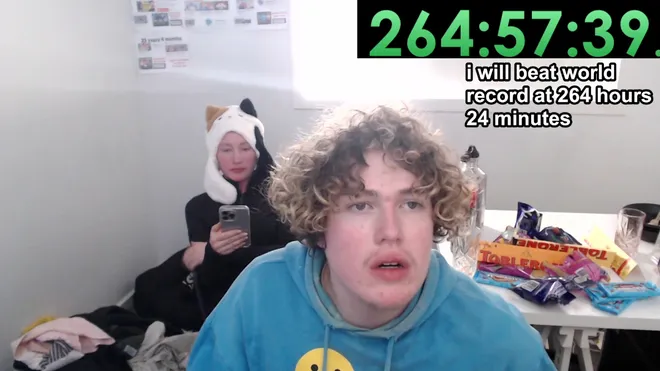Streamer stayed awake for 12 days straight to break a world record that doesn't exist
An Australian livestreamer was banned from multiple platforms for trying to stay awake for 12 days to break a Guinness World Record that is no longer being tracked due to health concerns.
Norme, 19, attempted to break the record for the longest time without sleeping, which was set in 1986 by Robert McDonald who remained awake for 18 days, 21 hours and 40 minutes. He tried for 12 days rather than 18 because 12 is the record without the use of stimulants.
Guinness World Records stopped monitoring this record in 1997 "due to the inherent dangers associated with sleep deprivation."
"Scientific studies suggest that even small amounts of missed sleep can negatively impact our mental and physical health," Guinness World Records said.
Despite Guinness World Records no longer acknowledging the record, Norme still gave it a go but encountered numerous issues, including being removed from YouTube and banned on livestreaming platforms Twitch and Kick.

Norme, who has around 1.21 million subscribers on YouTube, chronicled his attempt on X and during his livestreams at the beginning of August. While Norme fought sleep, he watched videos, hung out with friends, ate McDonald's, talked to his concerned chat members and played with his Elmo and Kermit the Frog dolls.
To remain awake, Norme said he had his friends take 12-hour shifts to make sure he did not fall asleep.
The streamer even replied to X users who questioned whether his lack of sleep affected his ability to read and remain conscious.
"This is mislinformation i regainec my abilility toread," Norme wrote in an X post after staying awake for 207 hours.
Norme 'swatted' and banned from YouTube and Kick
Issues began to arise for Norme on Aug. 11 when YouTube cut off his stream, Kick banned him and he got "swatted" as law enforcement entered his home due to a hoax report.
Norme eventually reached the 12-day mark, but he finished the stream on another platform called Rumble.
After reaching his goal, Norme noticed an ambulance outside of his home.
"U gotta be kidding me," the streamer wrote in an X post after seeing the ambulance.
Norme attempts 'world's longest sleep stream'
After hitting the 12-day mark, Norme announced that he would be doing a "world's longest sleep stream" on Twitch. The livestreaming platform banned Norme on Aug. 13, two days after beginning the sleep stream. He then announced that he would finish the stream on Rumble.
"SLEEP STREAM GOT BANNED ON TWITCH!! u arent allowed to sleep for too long," Norme wrote in an X post on Aug. 13.
When Norme woke up from his 38-hour sleep stream on Aug. 13, he shared a picture of his hands on X and wrote, "The skin started peeling off when I woke up (this) morning. Going to ER today will keep updated."
Is not sleeping dangerous?
Not sleeping, or sleep deprivation, has been associated with an increased risk of both cognitive decline and dementia, according to the Better Health Channel (BHC).
If someone does not get enough sleep or encounters sleep disruptions, it could have a "major impact on daytime functioning including poor concentration, reduced reaction times and altered mood," the BHC said.
Chronic sleep deprivation can harm brain, metabolic and immune health. People ages 18 to 64 should have 7 to 9 hours of sleep per night, according to the BHC.
Radio DJ was 'questioning his own identity' while doing Guinness World Record in 1959
Peter Tripp, a popular radio DJ who attempted the "sleeplessness" Guinness World Record in 1959, had his "emotions became highly erratic" after reaching the 140-hour mark. His perceptions also slowed and he began having hallucinations and delusions.
"He began questioning his own identity, and he claimed to see scurrying mice and kittens," according to Guinness World Records. "He also became paranoid; at first he accused doctors of trying to poison him, and then he thought they were conspiring to imprison him."
Tripp’s hallucinations ran on roughly 90-minute cycles and doctors described his mental state as "nocturnal psychosis." After 201 hours (8 days 9 hours) awake, Tripp slept for over 13 hours, Guinness World Records said.
Others who tried to break the sleeplessness record also suffered neurological and mental issues, including decade-long insomnia, brain fog and weight loss.
Disclaimer: The copyright of this article belongs to the original author. Reposting this article is solely for the purpose of information dissemination and does not constitute any investment advice. If there is any infringement, please contact us immediately. We will make corrections or deletions as necessary. Thank you.




